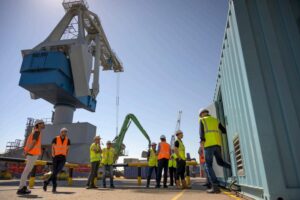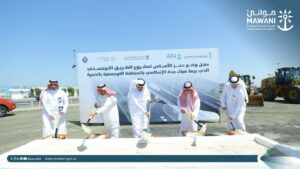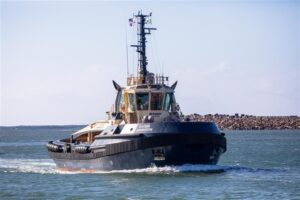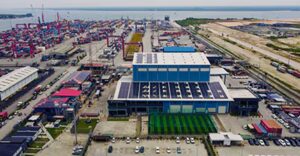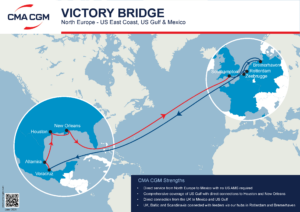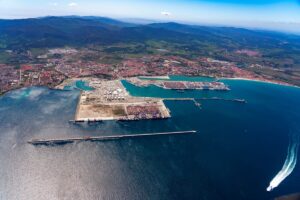Providing the keynote speech on day two of the Smart Ports: Piers of the Future event, Allard Castelein, CEO, Port of Rotterdam is set to put strong emphasis on climate goals for ports and the industry as well as highlighting how Rotterdam is achieving smart port status.
Speaking to PTI ahead of the event Castelein said the success of a port should not be measured by the volume of cargo that it processes but by the impact it creates on the rest of the supply chain and wider economy.
“The port of the future is the port that is best able to adapt to our changed world, a port that is digital and climate-neutral” Castelein said.
“In the port of the future, activities will be more transparent, predictable and efficient than ever. In the port of the future, objects will be able to communicate with each other without human intervention.”
Castelein explained that in this vision quay walls will be able to “talk” to ships, containers, cranes, terminals, trains, distribution centres and trucks, among much else.
“These exchanges help the port to optimally utilise the available capacity. The Port of Rotterdam Authority is currently realising the digital infrastructure for this development – fitting assets with the required sensors, for example.
“By now, hundreds of sensors have been installed throughout the port, and we are gleaning a mass of insights and potential improvement opportunities from their readings.
“For example, this data-driven approach already allows us to plan maintenance and dredging based on necessity rather than a fixed schedule.”
The imperative of increasing efficiency while cutting emissions requires ports such as Rotterdam to seek out supply chain partners to collaborate with.
According to Castelein, the Port has worked with local companies to optimise the logistics chains and increase connectivity with the hinterland and other major hubs.
Furthermore, it is working closely with technology providers, cargo owners and financial institutions to open “new and unexpected avenues” and develop novel, sustainable services.
If the world is going cut carbon emissions, the world needs to “change its habits as soon as possible”, said Castelein. Building an environmentally friendly port is intrinsically linked to building a smart logistics hub, and Castelein believes it can only be done gradually.
“We believe that the journey towards becoming a carbon-neutral port involves a series of steps, the first of which revolves around reducing the CO2-emissions of the existing industry.
“Secondly, we need to explore alternative energy sources. Thirdly, we need to replace fossil raw materials and create a circular economy. Besides the manufacturing industry, the transport and logistics sector also has to take steps to get ready for the port future.”
Approximately 25% of global CO2 emissions are caused by transport and up to 40% of this is attributed to cargo. With no action, carbon emissions could increase by as much as 250% by 2050.
However, Castelein believes shipping remains the most efficient way to move freight and the Port has sought ways to keep the emissions of the cargo that passes through as low as possible.
“We identified a number of pathways to reduce CO2 emissions for freight transport via Rotterdam. The most sustainable energy around is energy that isn’t used in the first place. Short-term reduction of our power consumption will yield immediate results.
“For example, when planning your itinerary, you can schedule your port calls as tightly as possible. Or keep the hull of your vessel clean to minimise drag.
“On the other hand, we can adapt our transport fuels. One example is sea-going vessels that complete a large share of their voyage running on synthetic fuels like hydrogen and methanol.
“Or we can use full-electric vessels for transport to the hinterland.”


